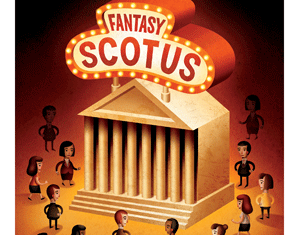 Law Technology News interviewed several members of the Harlan Institute, and wrote an article about how FantasySCOTUS is transforming the way predictions about the Supreme Court are made:
Law Technology News interviewed several members of the Harlan Institute, and wrote an article about how FantasySCOTUS is transforming the way predictions about the Supreme Court are made:
“Wait, does Vegas take odds on u.s. supreme court decisions?” That was the question posed by George Mason University law student Josh Blackman as he kidded around with colleague Yaakov Roth, speculating on the outcome of the U.S. Supreme Court case,Citizens United vs. Federal Elections Commission in 2009. They chatted about how cool it would be for law nerds to test their skill at predicting Supreme Court rulings — like playing manager in a fantasy football league.
The next day, Blackman registered FantasySCOTUS.net, and started designing the website. Launched that November, it attracted 5,000 users who made more than 11,000 predictions for all 81 cases decided during the Supreme Court’s 2009-10 term.
With another law student, Corey Carpenter (who has a degree in economics and econometrics), Blackman analyzed the results of that first season. Overall, the predictions were like a coin toss: right slightly more than half the time. But when looking only at the “power predictors” (the serious players who made the most predictions), the accuracy rate shot to 70%.
Soon, Blackman was getting emails from high school teachers who wanted to use the site to teach students about the court and the Constitution. So they set up a non-profit educational organization, the Harlan Institute (after Supreme Court Justice John Marshall Harlan), and created a spinoff designed to be a teaching tool.
Today, about 13,000 people play on the primary site, and about 1,000 students on the educational site, says Carpenter, director of analysis for the institute. (Blackman is president.) The players are not just lawyers and law students, but include people from all walks of life who simply enjoy following the court.
In fact, last year’s “chief justice” (the title given to the highest-scoring player) is a librarian and math tutor from Queens, N.Y. Jacob Berlove, who has degrees in mathematics and Judaic studies and aspires to be an actuary, says he found the site link on a law blog, and was thrilled to find a community of like-minded people. “None of my friends really shared my interest in the court,” he says.
Berlove may capture the title again this year — as of April, he had the top score. He denies a secret formula, attributing his success to careful analysis: He knows the law, looks at precedents, and carefully reviews oral arguments looking for patterns of emphasis. He reviews the comments of each justice, to hone in on each justice’s reasoning, he says.
The work of the Harlan Institute was also featured in another article in the Law Technology News, titled “Big Data Meets Big Law.”
Another organization investigating quantitative legal prediction is the Harlan Institute, a non-profit organization that promotes interest in and education about the Supreme Court.
It grew out of what started as more of a lark by Josh Blackman, a law student and self-professed Supreme Court nerd, who in 2009 launched a web-based fantasy league for predicting Supreme Court decisions (see “Place Your Bets” for more on the league). Called Fantasy SCOTUS, the site has built up a database of crowd-sourced opinions and analyses of many Supreme Court cases.
In an academic paper published in the Northwestern Journal of Technology & Intellectual Property [Vol. 10, p. 125, 2012], Blackman and co-authors suggest that Fantasy SCOTUS could combine the crowd-sourced data with data from publicly available court filings, then use an algorithm and decision engine to make predictions: “It would be quite conceivable for a bot to crawl through all of the filings in Pacer . . . and develop a comprehensive database of all aspects of how each court works.”
Josh Blackman will be presenting a paper on FantasySCOTUS at LawTechCamp at the University of Westminster in London on June 29, 2012.
